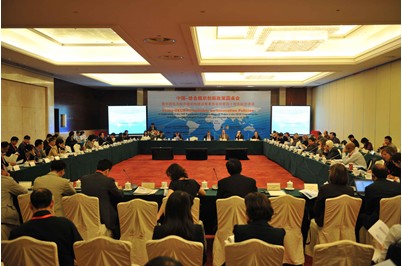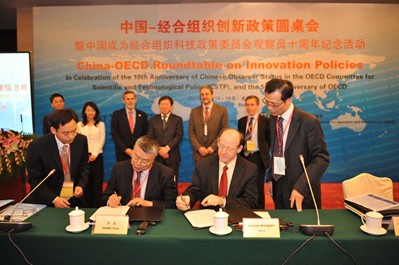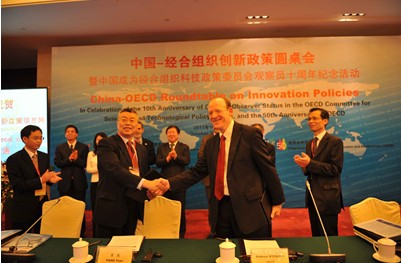August 18th -19th, 2011, China-OECD Roundtable on Innovation Policies was held in Beijing. It also celebrated the 10th Anniversary of Chinese Observer Status in the OECD Committee for Scientific and Technological Policy (CSTP), and the 50th Anniversary of OECD.
Mr. Cao Jianlin, Vice Minister of Science and Technology of the People's Republic of China (MOST), Mr. Richard Boucher, Deputy Secretary-General of Organization for Economic Co-operation and Development (OECD), Mr. Luis Sanz-Menende, Chairman of OECD-CSTP, gave keynote speeches at the opening session. Mr. Cao Jianlin and Mr. Boucher inaugurated the Liaison Office of China-OECD Science, Technology and Innovation (STI) Cooperation together and also launched the MOST website on China-OECD STI Policy (www.sti-oecd.cn). Mr. Andrew Wyckoff, Director of Directorate for Science, Technology and Industry (DSTI), OECD, and Dr. Wang Yuan, Executive Vice President of Chinese Academy of Science and Technology for Development (CASTED), MOST, signed the Statement of Intent for creating and running the independent website. Mr. Wyckoff released OECD Science, Technology and Industry Scoreboard 2011, and analyzed key indicators on achievements China has gained and challenges China is facing. In the opening session, Mr. Xue Lan, Dean of School of Public Policy and Management, Tsinghua University presented Chinese version of OECD Innovation Policy Review: China.
OECD and Chinese experts mainly talked about governance of national innovation systems, management of public research, and demand-side policies for innovation. Mr. Gernot Hutschenreiter, Principal Administrator of Country Studies and Outlook Division, DSTI gave a presentation under the title of Improving Governance of National Innovation System: Insights from OECD Reviews of Innovation Policy. Ms. Lin Xin, Deputy Director General of Department of Policy and Regulations, MOST talked about China's strategies and policies on science and technology development. Mr. Taiyoung Shin, Senior Fellow of Science and Technology Policy Institute (STEPI), Korea, spoke about Korea's strategy for development of STI capacity in a historical perspective. Mr. Wang Baoqing, President and Secretary-General of China Association for International Science and Technology Cooperation gave a speech with the title Capacity Building and Technology Transfer in the Context of Global Governance. Ms. Ester Basri, Principal Administrator of Science and Technology Policy Division, DSTI, OECD talked about Public Research Institutions concerning Mapping Sector Trends. Ms. Sveva Avveduto, Director of National Research Council, Italy talked about public research institution in Italy in terms of its change and continuity. She believed the strategic orientation was the key factor. Mr. Xue Lan proposed the research model of triangle relationship among the mission, operation and management of public research institution. Ms. Antti Pelkonen, Senior Scientist of VTT Technological Research Centre, Innovation Policy Research, Finland introduced Internationalization of Finnish Public Research Organizations. Mr. David Bloch, partner of Winston & Strawn LLP, United States, introduced procurement for innovation in the United States. Ms. Carol Bellettini, acting general manager of Department of Innovation, Industry, Science and Research, Australia, gave a speech with the title Australian experience on demand policy for innovation. Australia adopts carbon pricing policies to deal with climate change, improve energy efficiency and use renewable energy. Australia supports small and middle size enterprises (SME) to implement Clean Technology Innovation Program and Health Market Validation Program. Mr. Liu Feng, Director of Institute of Industrial Development, CASTED, introduced China's development on new emerging industries.
Although different countries have different situations, communication is still very important. It is believed that every country could have its highlight to be introduced to others, especially when facing global climate change, nature disasters, confections diseases and other common challenges, worldwide scientific cooperation becomes more important and necessary.
Some new issues were put forward in the roundtable. For example, Mr. Boucher, mentioned the measurement of intangible assets investment the measurement of impact of science and technology innovation on economic development. Mr. Wang Yuan asked about the content and approach when governing the innovative system. Experts believed these issues will be further explored, studied and discussed by governments, researchers, and stakeholders.
This roundtable was hosted by MOST and OECD, and organized by CASTED with about 100 Chinese and foreign participants. Chinese delegates came from governmental departments, research institutes, universities, etc. Foreign experts came from OECD-CSTP, OECD member countries, foreign embassies in China. Delegates from developing countries such as Malaysia, Indonesia and Uganda were also invited. (Reported by Luo Qingsheng, Translated by Gao Yi, Luo Qingsheng)




 No.8 Yuyuantan South Road, Haidian District, Beijing, 100038
No.8 Yuyuantan South Road, Haidian District, Beijing, 100038
 +8610 58884695 58884506
+8610 58884695 58884506
 +8610 58884678 58884588
+8610 58884678 58884588
 casted@casted.org.cn
casted@casted.org.cn
 http://www.casted.org.cn
http://www.casted.org.cn
